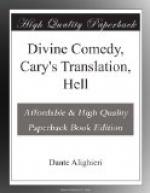Did issue forth, for utt’rance suited ill.
Though on the arch that crosses there I stood,
What were the words I knew not, but who spake
Seem’d mov’d in anger. Down I stoop’d to look,
But my quick eye might reach not to the depth
For shrouding darkness; wherefore thus I spake:
“To the next circle, Teacher, bend thy steps,
And from the wall dismount we; for as hence
I hear and understand not, so I see
Beneath, and naught discern.”—“I answer not,”
Said he, “but by the deed. To fair request
Silent performance maketh best return.”
We from the bridge’s head descended, where
To the eighth mound it joins, and then the chasm
Opening to view, I saw a crowd within
Of serpents terrible, so strange of shape
And hideous, that remembrance in my veins
Yet shrinks the vital current. Of her sands
Let Lybia vaunt no more: if Jaculus,
Pareas and Chelyder be her brood,
Cenchris and Amphisboena, plagues so dire
Or in such numbers swarming ne’er she shew’d,
Not with all Ethiopia, and whate’er
Above the Erythraean sea is spawn’d.
Amid this dread exuberance of woe
Ran naked spirits wing’d with horrid fear,
Nor hope had they of crevice where to hide,
Or heliotrope to charm them out of view.
With serpents were their hands behind them bound,
Which through their reins infix’d the tail and
head
Twisted in folds before. And lo! on one
Near to our side, darted an adder up,
And, where the neck is on the shoulders tied,
Transpierc’d him. Far more quickly than
e’er pen
Wrote O or I, he kindled, burn’d, and chang’d
To ashes, all pour’d out upon the earth.
When there dissolv’d he lay, the dust again
Uproll’d spontaneous, and the self-same form
Instant resumed. So mighty sages tell,
The’ Arabian Phoenix, when five hundred years
Have well nigh circled, dies, and springs forthwith
Renascent. Blade nor herb throughout his life
He tastes, but tears of frankincense alone
And odorous amomum: swaths of nard
And myrrh his funeral shroud. As one that falls,
He knows not how, by force demoniac dragg’d
To earth, or through obstruction fettering up
In chains invisible the powers of man,
Who, risen from his trance, gazeth around,
Bewilder’d with the monstrous agony
He hath endur’d, and wildly staring sighs;
So stood aghast the sinner when he rose.
Oh! how severe God’s judgment, that deals out
Such blows in stormy vengeance! Who he was
My teacher next inquir’d, and thus in few
He answer’d: “Vanni Fucci am I call’d,
Not long since rained down from Tuscany
To this dire gullet. Me the beastial life
And not the human pleas’d, mule that I was,
Who in Pistoia found my worthy den.”
I then to Virgil: “Bid him stir not hence,
And ask what crime did thrust him hither: once
A man I knew him choleric and bloody.”




